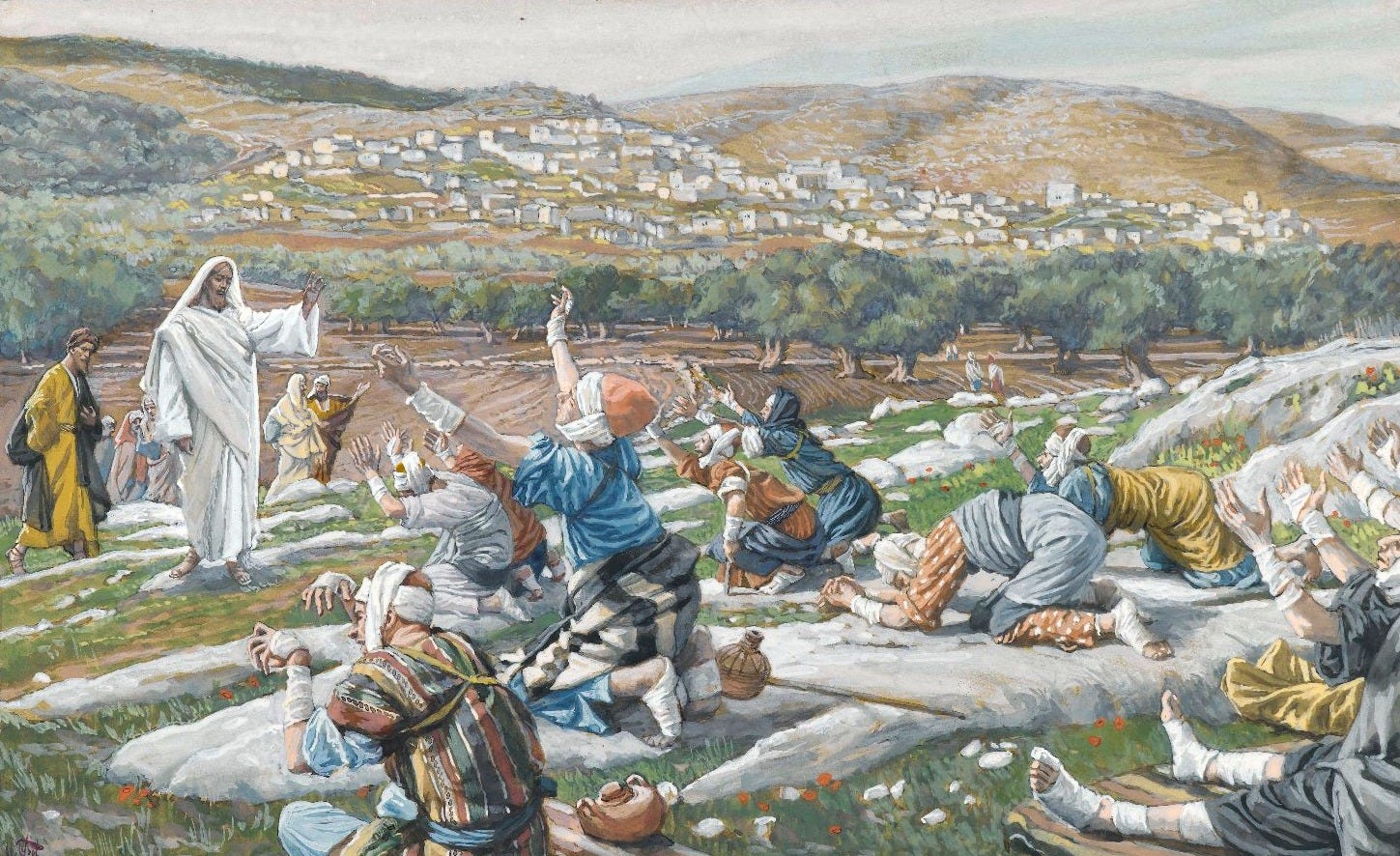What are we supposed to learn from Jesus healing the ten lepers?
Only one of the ten lepers returned to thank Our Lord.

Only one of the ten lepers returned to thank Our Lord.
Editor’s Notes
In this part, Fr Coleridge tells us…
How Christ teaches us to serve without claim, as those who belong wholly to God
That we are “unprofitable servants” – in that we can never render more than what we already owe to God
Why humility is the only safe foundation for high gifts or great labours
Coleridge shows us that true greatness lies in knowing we are nothing, and yet never ceasing to serve.
For more context on the events discussed in this mini-series, see Part 0.
Various Teachings and Counsels
The Preaching of the Cross, Vol. III
Chapter I
St Luke xvii. 1–19
Story of the Gospels, § 117, 118
Burns and Oates, London, 1888
Headings and some line breaks added.
Thirteenth Sunday after Pentecost
Why scandals are inevitable – and are especially evil in the clergy
Even the best are 'unprofitable servants' – and this is a source of joy
What are we supposed to learn from the healing of the ten lepers?
The ten lepers – why St Luke mentions this story
‘And it came to pass, as He was going to Jerusalem, He passed through the midst of Samaria and Galilee,’ that is, as it seems, along the border tract between the two, for the sufferers whom He relieved by the miracle of which we are to hear were mainly Galileans, which would hardly have been the case if the incident had occurred in the course of a direct journey across the Samaritan country from north to south.
‘And as He entered into a certain town, there met Him ten men that were lepers, who stood afar off, and lifted up their voices, saying, Jesus, Master, have mercy upon us! Whom when He saw, He said, Go show yourselves to the priests. And it came to pass, as they went, they were made clean.’
There can be no doubt that our Lord healed multitudes of lepers, as He healed multitudes of sick and afflicted persons of every kind. It is therefore likely that when any particular case is mentioned, there may have been some special reason why it should be recorded. In the case of the leper whose cure took place in Galilee, early in the history, as we find in all the three first Gospels, there may have been some such reason, either because that was the first occasion on which a leper was cured by our Lord, or because our Lord touched him, which no ordinary teacher would have done, or because he was a man of some importance and notoriety, or because the miracle made a great sensation, and thus forced our Lord to retire for the time ‘into desert places,’ instead of remaining in ‘the city.’
As St. Luke has related that miracle in its place, it would not be necessary, according to the rules which he usually observes in such cases, that he should relate the case now before us merely that he might give an instance of this kind of miracle in our Lord’s preaching. Thus it may be thought that this cure of the ten lepers is recorded for a particular purpose, and we may find that purpose in the beautiful lesson which is conveyed in our Lord’s words about the one leper who came back to thank Him when he found himself made whole.
Thankfulness
‘And one of them, when he saw that he was made clean, went back, with a loud voice glorifying God. And he fell on his face before His feet, giving thanks, and this was a Samaritan.’
As the lepers in general were banished from society and obliged to keep together, these men may have collected into one separate band from various villages in the same neighbourhood. The rule was not, it seems, universally enforced, and the leper whom our Lord healed in Galilee seems to have been living in seclusion in the town. In countries where lepers are found in our times, they are kept in rooms by themselves, without further banishment from their families.
The whole of the band of ten must have had faith, as all made the same prayer, and all equally obeyed the injunction of our Lord to go to the priests. In consequence of their faith and obedience, all were cleansed as they went, but one alone had the blessed instinct of giving thanks to our Lord at once.
The others may have been grateful, but their first thought was to have their cleansing tested and certified by the priest, and they cared more for the benefit which they had received than for the mercifulness of the giver or for His honour. Our Lord certainly seems to have been displeased with their want of thanksgiving, for He spoke of it to the Apostles.
‘And Jesus answering said, Were not ten cleansed and where are the nine? There is no one found to give glory to God but this stranger. And He said to him, Arise, go thy way, thy faith hath made thee whole.’
The rest of this article is for Father Coleridge Reader monthly/annual subscribers.
Father Coleridge Reader is a labour of love. But curating, cleaning up and publishing these texts takes real work.
To keep this project going, and to make more of this treasury available, we rely on reader support. Some posts are reserved for members to sustain this project.
We’re trying to keep something precious alive. To see more, see our ‘Manifesto.’
If you’ve benefited, consider joining us as a subscriber. It makes a real difference.

